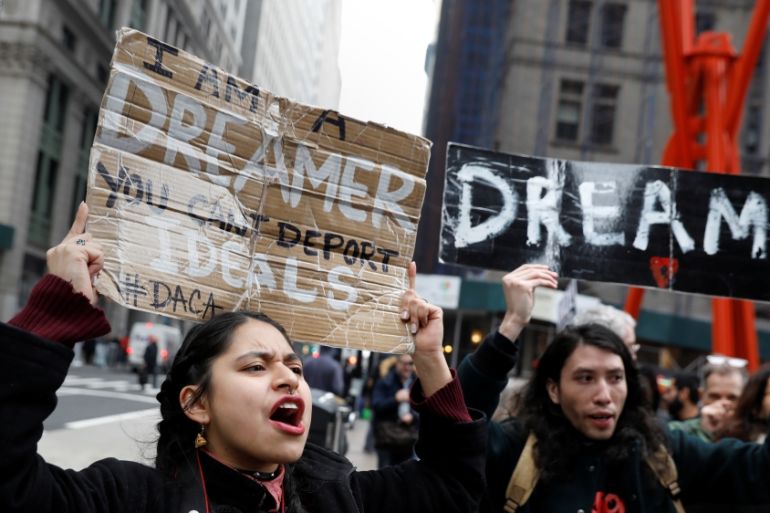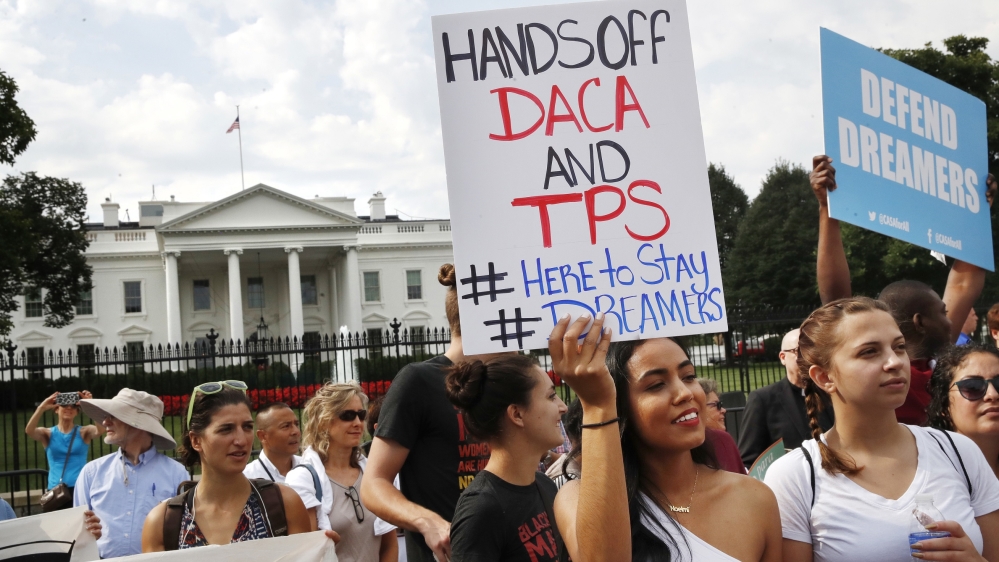US Supreme Court to rule on Trump bid to end ‘dreamers’ programme
Justices also say they’ll hear ‘bridgegate’ and religious school subsidies cases, but won’t take Alabama abortion case.

Adding a high-stakes immigration case to its election-year agenda, the Supreme Court said Friday it will decide whether President Donald Trump can terminate an Obama-era programme shielding young migrants from deportation.
The justices’ order sets up legal arguments for late fall or early winter, with a decision likely by June 2020 as Trump campaigns for re-election. The president ordered an end to the Deferred Action for Childhood Arrivals (DACA) programme in 2017, sparking protests and a congressional effort to salvage it.
Keep reading
list of 4 itemsFull jury panel seated on third day of Trump’s New York hush-money trial
Seven jurors seated on the second day of Trump’s New York hush-money trial
Six takeaways from first day of Trump’s New York hush money criminal trial
That effort failed, but federal courts in California, New York, Virginia and Washington have blocked him from ending it immediately. A federal judge in Texas has declared the programme is illegal but refused to order it halted.
The programme protects about 700,000 people, known as “dreamers”, who were brought to the US without documents as children came with families that overstayed their visas.
The DACA protections seem certain to remain in effect at least until the high court issues its decision.
The administration had asked the court to take up and decide the appeals by the end of this month. The justices declined to do so and held on to the appeals for nearly five months with no action and no explanation.
The court did nothing on Friday to clear up the reasons for the long delay, although immigration experts have speculated that the court could have been waiting for other appellate rulings, legislation in Congress that would have put the programme on a surer footing or additional administrative action.
“We are pleased the Supreme Court agreed that this issue needs resolution. We look forward to presenting our case before the court,” Justice Department spokesman Alexei Woltornist said.
Since entering the White House, Trump has intermittently expressed a willingness to create a pathway to citizenship for the hundreds of thousands of immigrants who have been protected by DACA. But he has coupled it with demands to tighten immigration and to build his long wall along the Mexican border – conditions that Democrats have largely rejected.
2020 issue
With the 2020 presidential and congressional election seasons under way or rapidly approaching, it seems unlikely that either party would be willing to compromise on immigration, a touchstone for both parties’ base voters. Three decades of Washington gridlock over the issue underscore how fraught it has been for politicians, and there is little reason to think a deal is at hand.
On the campaign trail, nearly all of the two dozen Democratic presidential candidates have pledged to work with Congress to provide a pathway to citizenship for millions of people in the country without documents – beginning with the dreamers. On the other hand, Trump sees his hard line immigration policies as a winning campaign issue that can energize his supporters.
The Obama administration created the DACA programme in 2012 to provide work permits and protection from deportation to people who, in many cases, have no memory of any home other than the United States.
The Trump administration has said it moved to end the programme under the threat of a lawsuit from Texas and other states that raised the prospect of a chaotic end to DACA.
Then-Attorney General Jeff Sessions determined the programme to be unlawful on the grounds that the-President Barack Obama did not have the authority to adopt it in the first place. Sessions cited a 2015 ruling by the federal appeals court in New Orleans that blocked a separate immigration policy implemented by Obama and the expansion of the DACA programme.

Texas and other Republican-led states eventually did sue and won a partial victory in a federal court in Texas. Civil rights groups, advocates for immigrants and Democratic-led states all have sued to prevent the end of the programme.
In November, a three-judge panel of the federal appeals court in San Francisco ruled that the administration decision to end DACA was arbitrary and capricious.
The appeals court noted that the federal government has a long and well-established history of using its discretion not to enforce immigration law against certain categories of people.
While the federal government might be able to end DACA for policy reasons under its own discretion, it can’t do so based on Sessions’ faulty belief that the programme exceeds federal authority, the court held.
Other cases
Bridgegate
Also on Friday, the Supreme Court announced it would hear several other cases including one involving two former New Jersey officials convicted of felonies for causing gridlock near the George Washington Bridge to punish a mayor for not backing their boss, former Republican Governor Chris Christie.
The justices announced they would hear the case in the fall involving Bridget Kelly and Bill Baroni that came to be known as Bridgegate. The two were convicted in 2016 on multiple counts of fraud and civil rights violations for changing the traffic pattern to one of the country’s busiest bridges without telling local officials.
Religious school subsidies
The justices also said they would decide the legality of a Montana state tax credit that could help students attend private schools including religious ones.
The justices took up an appeal by three mothers of Christian private school students of a decision by Montana’s top court striking down the programme because it ran afoul of a state constitutional ban on aid to religious institutions.
Damages against Sudan over embassy bombings
Finally, the court on Friday said they would hear a bid to reinstate $4.3bn in punitive damages against Sudan in a lawsuit accusing it of complicity in the 1998 al-Qaeda bombings of two US embassies in Kenya and Tanzania that killed 224 people.
The justices took up an appeal by hundreds of people hurt and relatives of people killed in the bombings as they seek to reinstate the punitive damages that a lower court in 2017 ruled could not be levied against Sudan in addition to about $6bn in compensatory damages imposed in the litigation.
Declines to hear Alabama abortion case
The Supreme Court said it would not hear Alabama’s bid to revive a Republican-backed state law that would have effectively banned abortion after 15 weeks of pregnancy, sidestepping a major new challenge to abortion rights.
The justices left in place a lower court ruling that struck down the 2016 law, which would have criminalised a method called dilation and evacuation that is the most common type of abortion performed during the second trimester of pregnancy.
The law in question is different from an even more strict Alabama measure signed by Republican Governor Kay Ivey in May. The new law, also facing a legal challenge, would ban nearly all abortions in the state, even in cases of rape and incest.